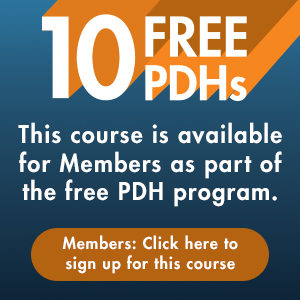<< Back
 View Important System Requirements for running this course.
View Important System Requirements for running this course.
Instructor Information:Stuart G. Walesh, Ph.D., P.E., F.NSPE, Dist.M.ASCE
Course Length: 1 Hour
Purpose and Background
Ralph Waldo Emerson said, “It is one of the most beautiful compensations of this life that no man can seriously try to help another without helping himself.” Helping another person is the heart of mentoring. While informal mentoring may be preferred, it is rare within engineering and similar entities.
Accordingly, some organizations establish formal, usually volunteer mentoring programs. This one-hour webinar begins by explaining the fundamentals of mentoring. Mentoring is contrasted with other less intensive teaching-learning experiences. Tips are offered, as appropriate, to mentors and to protégés. Essentials of formal mentoring programs are explained and illustrated.
Participants receive a detailed handout on which the webinar will draw. The handout includes many and varied resources that can be used by employers and their personnel such as articles, books, e-newsletters, and websites.
Learning Outcomes
Upon completion of this course, you will be able to:
0 Item(s)
Mentoring: Guidance for Mentors, Proteges and Organizations (AWI111710)
CEU:0.1
On-Demand Webinar | Online
Product
On-Demand Webinar
Location
Online
Credit
CEU:0.1
Keyword(s)
Management and Practice
Description
 View Important System Requirements for running this course.
View Important System Requirements for running this course.Instructor Information:Stuart G. Walesh, Ph.D., P.E., F.NSPE, Dist.M.ASCE
Course Length: 1 Hour
Purpose and Background
Ralph Waldo Emerson said, “It is one of the most beautiful compensations of this life that no man can seriously try to help another without helping himself.” Helping another person is the heart of mentoring. While informal mentoring may be preferred, it is rare within engineering and similar entities.
Accordingly, some organizations establish formal, usually volunteer mentoring programs. This one-hour webinar begins by explaining the fundamentals of mentoring. Mentoring is contrasted with other less intensive teaching-learning experiences. Tips are offered, as appropriate, to mentors and to protégés. Essentials of formal mentoring programs are explained and illustrated.
Participants receive a detailed handout on which the webinar will draw. The handout includes many and varied resources that can be used by employers and their personnel such as articles, books, e-newsletters, and websites.
Learning Outcomes
Upon completion of this course, you will be able to:
- List 8 do’s and don’ts for protégés and mentors
- Discover 11 do’s and don’ts for mentors
- Consider 4 do’s and don’ts for protégés
- Appreciate 3 benefits for mentors
- Review 14 tips for starting a mentoring program
Seminar Benefits
- Help others re-examine roles, goals, strengths, weaknesses, opportunities, and threats
- Assist others in realizing their potential
- Enhance your future
- Strengthen your organization
- Improve retention and recruitment
Assessment of Learning Outcomes
- Discover 11 do’s and don’ts for mentors
- Consider 4 do’s and don’ts for protégés
- Appreciate 3 benefits for mentors
- Review 14 tips for starting a mentoring program
Seminar Benefits
- Help others re-examine roles, goals, strengths, weaknesses, opportunities, and threats
- Assist others in realizing their potential
- Enhance your future
- Strengthen your organization
- Improve retention and recruitment
Assessment of Learning Outcomes
Students' achievement of the learning outcomes will be assessed via a short post-assessment (true-false, multiple choice and fill in the blank questions).
Intended Audience
This webinar will assist three audiences. The first is leaders of business, government, academic, and volunteer organizations that are contemplating establishing formal mentoring programs. The second and third audiences are current or potential mentors and mentees (protégés). Mentoring offers major benefits to organizations, mentees, and even mentors. However, formal mentoring programs require careful planning and major on-going efforts and, therefore, should be approached cautiously.
Seminar Outline
- Mentoring defined and contrasted with other teaching-learning methods
- Power of mentoring
- Natural and formal mentoring
- Do’s and don’ts for mentors
- Do’s and don’ts for protégés
- Essentials of starting a formal organizational mentoring program
- Organizational consequences of failure
- Case studies and lessons learned
- Resources for additional study
This webinar will assist three audiences. The first is leaders of business, government, academic, and volunteer organizations that are contemplating establishing formal mentoring programs. The second and third audiences are current or potential mentors and mentees (protégés). Mentoring offers major benefits to organizations, mentees, and even mentors. However, formal mentoring programs require careful planning and major on-going efforts and, therefore, should be approached cautiously.
Seminar Outline
- Mentoring defined and contrasted with other teaching-learning methods
- Power of mentoring
- Natural and formal mentoring
- Do’s and don’ts for mentors
- Do’s and don’ts for protégés
- Essentials of starting a formal organizational mentoring program
- Organizational consequences of failure
- Case studies and lessons learned
- Resources for additional study
How to Earn your CEUs/PDHs and Receive Your Certificate of Completion
To receive your certificate of completion, you will need to complete a short on-line post-test and receive a passing score of 70% or higher within 1 year of purchasing the course.
How do I convert CEUs to PDHs?
1.0 CEU = 10 PDHs [Example: 0.1 CEU = 1 PDH]
